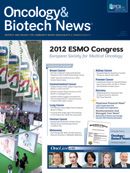Publication
Article
Oncology & Biotech News
Researchers Seek Optimal Dose of Cabozantinib in mCRPC
Author(s):
Single-agent cabozantinib has shown promising activity in early-stage trials involving heavily pretreated patients with metastatic castration-resistant prostate cancer. Researchers are now attempting to find the optimal dose of the drug in this patient population.
Johann S. de Bono, MD
Single-agent cabozantinib (XL 184) has shown promising activity in early-stage trials involving heavily pretreated patients with metastatic castration-resistant prostate cancer (mCRPC). Researchers are now attempting to find the optimal dose of the drug in this patient population. At the 2012 ESMO Congress, data presented from an expansion cohort of a phase II trial demonstrated that a 40 mg dose of cabozantinib achieved bone scan resolution, substantial pain relief with a narcotic-sparing effect, and reductions in bone turnover markers and circulating tumor cells in patients with mCRPC.
“Treatment of mCRPC is a high unmet need; despite all the new drugs we have, our patients still die. Cabozantinib showed promising results in this preliminary trial. MRI results are consistent with an antitumor effect,” stated lead author Johann S. de Bono, MD, Royal Marsden Hospital and Institute of Cancer Research, Sutton, England.
Cabozantinib is a multikinase inhibitor of MET and VEGFR2. Results from an expansion cohort of a phase II trial showed antitumor activity at a dose of 100 mg/day, with impressive bone scan responses, pain reduction, and soft tissue disease regression, but at this dose, 84% of patients required dose reduction, de Bono explained.
The 40 mg/day of cabozantinib expansion cohort from the same phase II trial was launched with the hope of selecting an optimal dose and moving the drug forward to phase III trials.
Fifty-one patients with a median age of 66 years were enrolled in the expansion cohort. All patients had bone metastasis, and 31% had visceral metastasis. All had been treated with docetaxel, and 71% had two or more previous lines of therapy for metastatic disease. Fifty-three percent had pain scores of 4 or higher, and 45% were taking narcotics. All patients had ECOG performance status 0-1.
The primary endpoint was bone scan response, which is a computer-assisted technique to measure the number of pixels of uptake after normalizing the scan. De Bono noted that this is not a proven intermediate endpoint for survival.
Other endpoints were progression-free survival, pain severity and narcotic use, and safety and tolerability. Median treatment duration was 4.7 months.
Almost half the patients (49%) had a 30% or more decrease in uptake, and 29% had stable disease on bone scan. On RECIST, response rate was 10%, and about 71% had stable disease.
In 26 patients with a baseline pain score of 4 or higher, 69% had at least a 30% reduction in pain, and narcotic use was decreased in 58% of patients.
The most frequently reported adverse events were fatigue, anorexia, and slight increase in thromboembolism.
“Fatigue is a significant issue [with this drug], and venous thromboembolism is an issue. Fatigue is probably the main issue that would necessitate dose reduction. It is not clear why this drug causes so much fatigue,” de Bono said.
“Selecting a single best dose of this drug for all patients, as with many cancer drugs, is a critically important issue due to interpatient pharmacokinetic variability. Perhaps in the future we should dose escalate in each individual patient to achieve an individualized best dose for each patient, for such targeted anticancer drugs. Nevertheless, this drug’s best dose is higher than 10 to 20 mg where it is less active, and lower than 100 mg where it is too toxic and ranges between 40 and 60 mg overall,” de Bono said during the discussion period following his presentation.
De Bono JS, Smith MR, Rathkopf DE, et al. Cabozantinib (XL 184) at 40 mg in patients with metastatic castration resistant prostate cancer (mCRPC): results of a phase 2 nonrandomized expansion cohort (NRE). Presented at: 37th European Society for Medical Oncology Congress; September 28-October 2, 2012; Vienna, Austria. Abstract 897O.
































%20(2)%201-Recovered-Recovered-Recovered-Recovered-Recovered-Recovered-Recovered-Recovered-Recovered-Recovered-Recovered-Recovered-Recovered-Recovered-Recovered-Recovered-Recovered.jpg?fit=crop&auto=format)
%20(2)%201-Recovered-Recovered-Recovered-Recovered-Recovered-Recovered-Recovered-Recovered-Recovered-Recovered-Recovered-Recovered-Recovered-Recovered-Recovered-Recovered-Recovered.jpg?fit=crop&auto=format)
